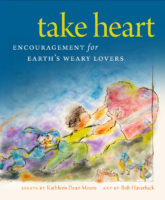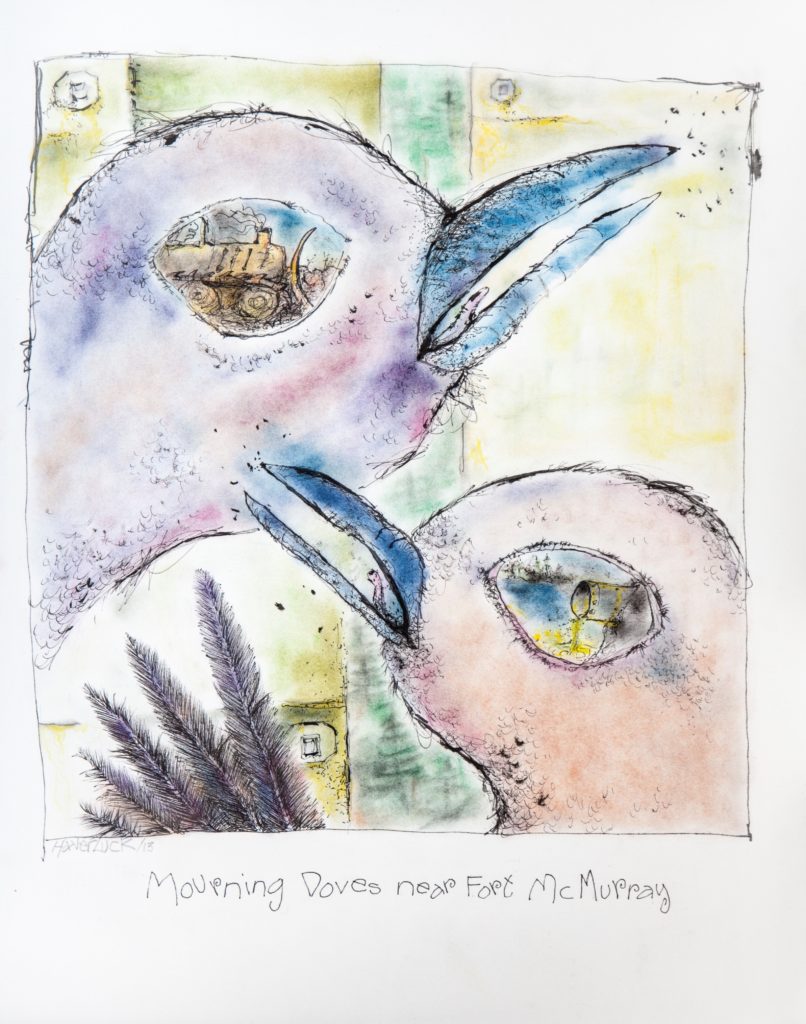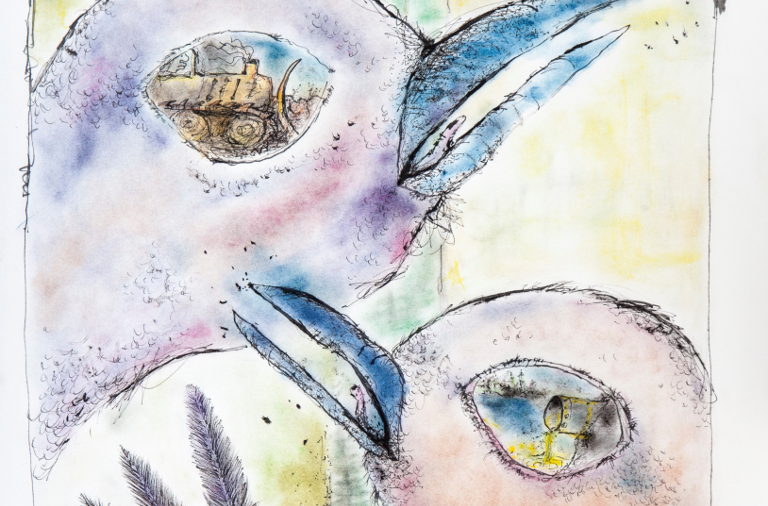 Ed. note: The following piece is excerpted from Take Heart: Encouragement for Earth’s Weary Lovers, by Kathleen Dean Moore, and published by Oregon State University Press, with a release date of June 1, 2022. You can find out more about the book here.
Ed. note: The following piece is excerpted from Take Heart: Encouragement for Earth’s Weary Lovers, by Kathleen Dean Moore, and published by Oregon State University Press, with a release date of June 1, 2022. You can find out more about the book here.
Five Thoughts about Sacrifice
1.
‘Sacrifice zone’ is defined as “a geographic area that has been permanently impaired by environmental damage, often through locally unwanted land use.” Take, for example, the boreal forest surrounding Fort McMurray near the Athabasca River in Alberta, once an expanse of wetlands, bogs, and trembling-aspen and white-spruce forest — hunting grounds for First Nations people and habitat to caribou, bears, mourning doves, and wolves. All of that is gone now — not just damaged, but simply missing from the face of the Earth. The forest is razed, the animals killed or driven out, the ground scraped away to expose bitumen mines in open pits, the hills bulldozed to make vast tailing ponds to hold toxins now leaking into the river, and the People poisoned and displaced.
This is the center of oil-sands operations in Canada, the world’s largest industrial project. The scale of destruction is astonishing. Fourteen million hectares, which is 34 million acres, which is 54,000 square miles, which is the area of New York State, or one-fifth of all Alberta. Or put it this way: the diameter of the tar-sands impact is four times longer than the diameter of the crater dug by the asteroid that ended the era of the dinosaurs. Easily visible from space as a pocked and puckered scar, this is what National Geographic calls the “world’s most destructive oil mining operation.”
The massive wound is the visible manifestation of a long chain of ‘sacrifices.’ In order to mine oil on this scale, corporations have to sacrifice the land. When they sacrifice the land, they sacrifice the plants and animals of the ecosystem. When they sacrifice the ecosystem, they sacrifice the homeland and subsistence livelihoods of the people. When they sacrifice their livelihoods, they sacrifice their rights to life, health, fresh water, and heritage. When they sacrifice their rights, they sacrifice the dignity and well-being they deserve.
I would not use the word ‘sacrifice’ for all this taking, taking — when ‘demean and destroy forever’ would do just as well.
2.
‘Sacrifice’ is defined as the act of giving up something that you value, in order to get something else you value. The word comes from the Latin, sacra (holy) and facere (to make). To make holy. In the old days, people offered a sheep or lamb as a sacrifice to God, cleansing both the offerer and the sanctuary in a ritual of purification. Now, in return for immense profits, corporations are offering, to the great god Money, items of value that are not theirs to give — not the land, not the animals and trembling trees, not the purity of air and water, not the homelands or the humanity of the people. This is a ritual of moral staining — fouling what was clean, profaning what was holy, drenching corporate executives in sin.
3.
A ‘sacrilege’ is a violation or misuse of what is regarded as sacred. It comes from the Latin sacrilegium, from sacrilegus (stealer of sacred things), from sacer (sacred) + legere (take possession of). This is exactly the word we need. International oil and gas corporations are stealers of sacred things. Here are the sacred mourning doves of Fort McMurray, with earthmovers in their vision and lesions on their eyes. Here is a bulldozed and broken aspen tree, the sacred leaves that once danced in silver light now buried in the mud. Here is a sacred seven-year old child of the Fort McKay First Nation, born with an underdeveloped heart. It’s a sacrilege.

4.
In an essay called “The Moral Climate,” activist-ecologist Carl Safina observed that the ad-men for oil and gas have convinced people that changing from an oil-powered life would amount to sacrificing their own interests to the interests of people in the future.
Carl explained: “Dysfunctional values married to catastrophic leadership have led us to the place you go when you are made to believe that solution is sacrifice and that sacrifice for a just cause is not noble but, rather, out of the question. . . .The refusal to “sacrifice” is actually a pathological refusal to change for the better. . . . We think we don’t want to sacrifice, but sacrifice is exactly what we’re doing by perpetuating problems that only get worse; we’re sacrificing our money, sacrificing what is big and permanent to prolong what is small, temporary, and harmful. We are sacrificing animals, peace, and children to retain wastefulness — while enriching those who disdain us.”
5.
The times call for new sacrificial rituals. Let us kill the fatted calf of the fossil-fuel industries by taking away their social license to steal and destroy the sacred Earth. Let us cleanse ourselves of the oil-drenched practices that cause deep harm, renouncing dirty investments in fossil fuels, long commutes, poisoned food, and the machines of war. Let us refuse to allow industry to make sacrificial lambs of the Indigenous people and people of color who bear the terrible burdens of energy ‘development.’ Let us find again the sacred in what we have been persuaded is only ‘raw material’ or ‘natural resource.’ By these rituals of purification and atonement, let us — as people have done since ancient times – work to restore a right relationship of human beings to the sacred order.
Illustration by Bob Haverluck






